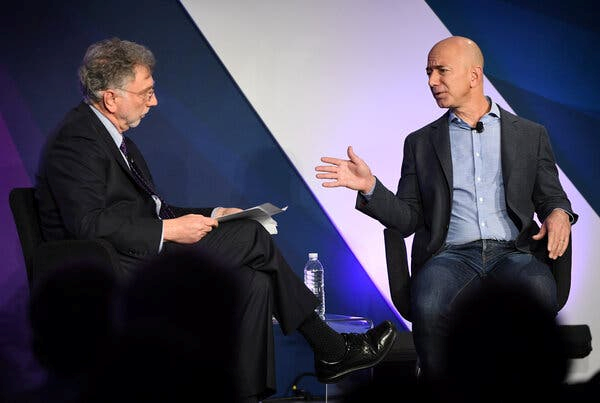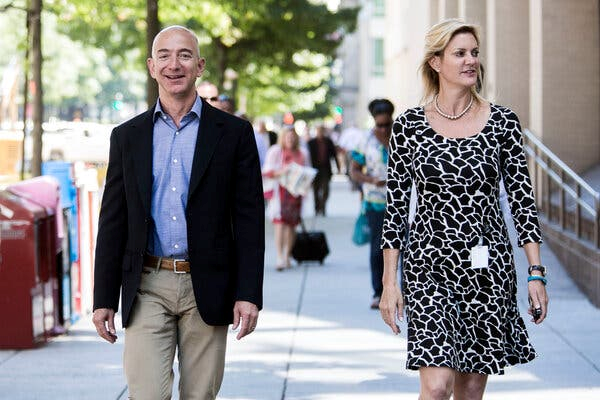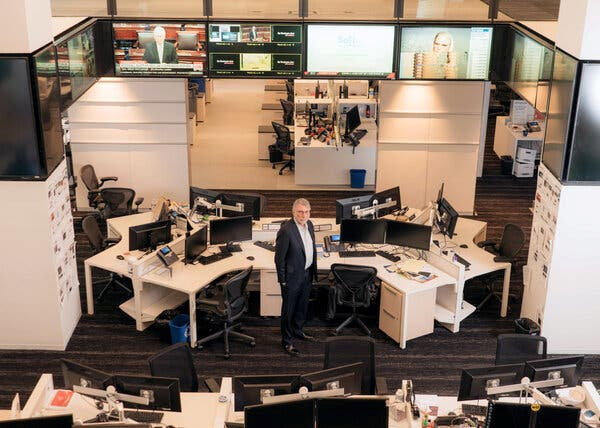How Marty Baron and Jeff Bezos Remade The
Washington Post
The celebrated editor is ending his
tenure at the helm of a very different newspaper than the one he
originally signed on to run.
|

When Martin Baron took the took job at The Washington Post in
2013, the company was struggling to survive. Then The Post was
sold and it began to expand.
Justin T. Gellerson for The New York Times |
Feb. 27, 2021
On July 30, 2013, Martin Baron left The Washington Post building and crossed
15th Street for an extremely rare happy hour drink.
The publisher, Katharine Weymouth, had asked to meet him at a hotel bar. She
needed to tell her executive editor that The Washington Post Company would be
selling the newspaper her family had run for 80 years to the Amazon founder Jeff
Bezos.
“I’m sure I felt terrible,” said Ms. Weymouth in a recent interview. “He had
just moved!” Mr. Baron had arrived in Washington, and at The Post, in January
after 11 celebrated years as the top editor at The Boston Globe.
Mr. Baron was shocked. So were most people at The Post six days later, when the
public announcement was made. Ms. Weymouth represented the fourth generation of
her family to run the newspaper. Her grandmother, Katharine Graham, and her
uncle, Donald E. Graham, had been viewed as indispensable not just to The Post
but to its city. Now the paper would belong to Mr. Bezos, the multibillionaire
online retail magnate, who noted in his introductory memo to the staff that he
lived in “the other Washington.”
Karen Tumulty, a political correspondent who had arrived from Time three years
earlier, emerged from the spa at a resort in California to the message that her
husband had been trying to reach her. Her first call after hearing about the
sale was to Mr. Baron, a friend of hers since 1980 and the best man at her
wedding.
“He was just really calm about it,” she recalled. “Said this was going to be a
good thing.”
In the days between hearing about the sale and the public announcement, Mr.
Baron had realized that Mr. Bezos, who built Amazon by giving it years of
“runway” to lose money in the name of long-term growth, had not bought The Post
to continue shrinking it.
Mr. Bezos, who declined to be interviewed for this article, supplied resources
as perhaps only one of the world’s wealthiest men operating a newly private
company could. He appointed a new publisher and turned The Post’s business
strategy — and, by extension, its journalistic one — upside down, stipulating
that its outlook would change from local to national, even global. Since 2013,
the newsroom head count has nearly doubled — it is expected to reach 1,010 this
year — with 26 locations around the world, according to a spokeswoman.
Mr. Baron, who announced his
retirement last month and whose last day is Sunday, had signed up to
edit one newspaper and ended up for more than seven years at the helm of a very
different one.
The first Post was among the country’s best daily papers, but hurting. Ms.
Weymouth and Mr. Graham, the chief executive of The Post Company, “were going a
little light on me” in his first year, according to Mr. Baron, and making him
eliminate only a couple of dozen positions. “In the second year,” he added, “I
would feel the full effects of the cuts that were deemed to be necessary.”
By contrast, the second Post — the one Mr. Baron ran for most of his tenure —
had more resources and different priorities. While many desks have grown, Metro
staffing has stayed constant. The Post is digital first to the point that its
print circulation has been more than halved since 2013, according to numbers
from the Alliance for Audited Media, with Sunday print circulation around
320,000 last fall.
Mr. Baron’s Post was not squeamish about what it meant to chase a big digital
audience. Whoever succeeds Mr. Baron — the publisher, Frederick J. Ryan Jr., is
leading the search — will inherit roughly three million digital subscribers,
said a spokeswoman, the most of any U.S. paper after The New York Times. The
Post website has been topping 100 million monthly unique visitors of late and is
neck and neck with The Times, according to Comscore.
The upshot has been a truly national paper, unmissable not just for
inside-the-Beltway scoops but for understanding the country at large.
“Marty was just the right editor for The Washington Post for the last eight
years — thank God,” said Mr. Graham. “Marty is old-fashioned in the way he
approaches the news. He believes in truthfulness and completeness and accuracy
and fairness.”
It is a happy ending for The Post, for Mr. Baron and for Mr. Bezos, who earlier
this month announced that
he was stepping down as chief executive of Amazon to spend more time with other
pursuits, including The Post.
It is a less happy ending by implication for local newspapers elsewhere, which
are increasingly owned not by benevolent billionaires but chains that answer to
Wall Street and generally lack the name brand that made The Post’s quest for
digital subscribers across the country plausible. As The Post’s fortunes have
flourished, the fate it escaped has grown grimmer.
Absent Mr. Bezos, “it’s highly likely that our future would have looked a lot
like the present of a lot of regional publications,” Mr. Baron said in a phone
interview last weekend as he cleared out his office at The Post. “There’s no
reason to believe it would have been substantially different.”
An Illustrious Gig, Managing Decline
|

Martin Baron, left, and Jeff Bezos in 2016. After Mr. Bezos
bought The Post in 2013, Mr. Baron had more resources and sought
a bigger digital audience.
Getty Images |
Mr. Baron, 66, was already bound for journalism Cooperstown when he
joined The Post at the beginning of 2013. As The Miami Herald’s
executive editor, he presided over coverage of the 2000 election
recount and Elián González’s repatriation. Then, at The Boston Globe,
he oversaw a landmark investigation into sexual abuse in the Roman
Catholic Church, later made into the Academy Award-winning film
“Spotlight.” Liev Schreiber played Mr. Baron as scruffy, which he is
in real life, and gruff, which he swears he is not.
To edit the newspaper of Woodward and Bernstein was too enticing to pass up
(although when Ms. Weymouth approached Mr. Baron during her previous search for
an executive editor, in 2008, he was not interested). But he expected his job
would involve some managed decline.
At the beginning of 2013, The Post was modestly profitable but no longer the
money-minting machine it was in the 1980s and ’90s, when it reached more
households in its geographic area than any other daily. The Post Company’s
financial shape was worsening, however, as Kaplan, its test-preparation and
for-profit college business, was squeezed by new federal rules.
There were multiple rounds of buyouts between 2008 and 2013; a generous pension
plan hastened veterans’ exits. Newsroom head count fell to 580 from 900. To this
day, Posties speak in gallows-humor tones of all the cake they ate at Friday
afternoon office send-offs.
As publisher, Mr. Graham invested tens of millions of dollars in digital
initiatives as far back as the 1990s. The digital and traditional newsrooms were
combined under Mr. Baron’s predecessor as executive editor, Marcus Brauchli. The
Post installed a metered paywall in June 2013.
The Post had not embraced a corollary to its digital friendliness: an aggressive
strategy to recruit readers and subscribers from beyond its geographic base.
“The Post was distinctive in that it had a global reputation but a local
business model,” said Steve Coll, a former Post reporter and managing editor who
is now a staff writer at The New Yorker.
After The Post decided to sell its 50 percent stake of The International Herald
Tribune to its partner, The New York Times, in late 2002, Mr. Coll organized a
task force including editorial and business executives to plot The Post’s place
in the national and international news ecosystem. They concluded that The Post
should invest in expanding its digital reach beyond the Beltway.
But on a retreat at an Eastern Shore resort in early 2003, Mr. Graham, then the
publisher, rejected the recommendations in part because they de-emphasized
covering the region. The Post’s local mission was a matter of both business and
identity for Mr. Graham, whose grandfather had bought The Post out of bankruptcy
in 1933.
“We are not a national newspaper,” Mr. Graham told The New Yorker for a 2000 profile.
“We are a local newspaper for a place that happens to be the capital of the
United States.”
For and About Washington
Ms. Weymouth, who succeeded her uncle as publisher in 2008, determined that to
combat declining print profitability, The Post would double down on being “about
Washington, for Washingtonians,” she wrote in a staff memo in 2008.
“We continued to function at an extremely high level, but our ambition had been
forcefully diminished,” said Peter Perl, a former assistant managing editor and
longtime Postie (he is the author of Mr. Graham’s prewritten obituary for the
paper).
“There’s a big fire or a big plane crash, it used to be, the philosophy was,
‘Why wouldn’t we cover that?’” he added. “Then it became, ‘Well, why would we?”
Still, Mr. Graham and Ms. Weymouth felt that the long-term outlook was not
brilliant. In 2010, they sold Newsweek for $1 plus assumption of liabilities,
and Ms. Weymouth did not want The Post to get to the same point. During Mr.
Baron’s first spring, in 2013, The Post Company sought to sell its eponymous
product.
|

Under the publisher Katharine Weymouth, right, The Post focused
on being “about Washington, for Washingtonians,” she said. When
Jeff Bezos, left, bought the company, he said it would be a
national, even global, paper.
T.J. Kirkpatrick/Bloomberg |
The sale to Mr. Bezos was conditioned on a commitment to invest in the
newspaper, said Nancy Peretsman, an investment banker at Allen &
Company who advised The Post Company on the move.
“This was the basis of the handshake: I’m entrusting you with my family legacy —
what Kay would have wanted,” said Ms. Peretsman, referring to Katharine Graham,
the former Post publisher and Mr. Graham’s mother.
Almost immediately after Mr. Bezos’s purchase of the newspaper in August 2013,
he dictated that The Post would use its location and reputation to go national,
even global.
“The first substantive point that he made to us,” said Mr. Baron, “was that the
strategy that we had of being focused on our region — of being, as they put it,
for and about Washington — that may have worked in the past, but it wasn’t going
to work any longer.”
This meant new investment. Instead of having to let people go in his second
year, Mr. Baron was hiring by the end of his first.”
Marty’s sense was they wanted to see the best paper they could produce,” said
Alberto Ibargüen, who was the Miami Herald publisher when Mr. Baron was
executive editor. “That’s when Marty began to hire additional people for the
newsroom at a time when other newsrooms were letting people go.”
Mr. Baron and Mr. Bezos are not friends (leaving aside the office birthday party
when Mr. Bezos presented his editor with a new bicycle). Mr. Baron generally
attends Mr. Bezos’ biweekly meeting with Mr. Ryan, the publisher. Still, a
certain rapport was evident during an onstage interview in 2016 at a
Post-sponsored conference in Washington, Mr. Baron dry and grumbly (“in
journalism, interviewing the owner of the company is considered to be high-risk
behavior”) and Mr. Bezos cheerfully evangelistic.
The internet demolished media’s traditional business models, Mr. Bezos explained
in the interview, “but it does bring one huge gift, and you have to maximize
your usage of that new gift, which is that it provides almost free global
distribution.”
In this way, he added, The Post would go from relying on relatively few
subscribers paying lots of money — those seven-day print subscriptions delivered
to Bethesda, to Arlington, to Albemarle Street — to persuading many more
subscribers to buy cheaper digital-only subscriptions.
An Overhaul of ‘Hoary Assumptions’
|

As Mr. Baron prepares to retire, he says he considers himself
lucky: “I’ve been able to avoid the worst aspects of what this
industry has faced over the last 30 years.
Justin T. Gellerson for The New York Times |
Much of what Mr. Baron’s Post did in executing this strategy is
entirely in keeping with a man who stepped into a professional
newsroom in the mid-1970s and did not leave before Sunday. The Post
has been indispensable to the general understanding of right-wing
populism, tech platforms and of course the Trump administration and
the man at its center; the “Access Hollywood” tape of 2016 and the one
this year featuring Georgia’s secretary of state were both Post
exclusives. The Post this past week dominated the George Polk Awards,
one of journalism’s most prestigious prizes, for stories and series
from around the country and barely a mention of Donald J. Trump, even
as, like many media organizations, how it will adjust to a
less-caffeinated political news environment is unknown.
But plenty was innovative, such as an online section devoted to breaking news
continuously, a team focused on how best to deliver Post journalism to readers
and a section covering video games and e-sports. (“A lot of it got replicated by
The New York Times,” Mr. Baron said archly.) Last year, The Post was among many
newsrooms nationwide that at a time of widespread protests over systemic racism
confronted its own culture. Mr. Baron created new positions for editors and
writers to cover race and appointed The Post’s first managing editor for
diversity and inclusion, a longtime reporter and editor named Krissah Thompson.
“Marty made clear in the beginning that this was a role in senior leadership on
par with the other managing editors,” Ms. Thompson said.
The focus on diversity in coverage is not unrelated to the business’s focus on
diversity in readership. For instance, Ms. Thompson is interested in exploring
what distinguishes articles that do not perform well with subscribers but are
excellent at converting casual readers into subscribers. “Are we profiling
people who may not be part of the current Washington conversation,” she said,
“but are figures the Black community or Hispanic community might be interested
in?”
In January 2014, The Post inaugurated Morning Mix, a section staffed by
reporters and editors who worked overnight to surface viral stories. It evolved
from aggregation to “the second-day story today,” as its first editor, Fred
Barbash, put it. The Columbia Journalism Review last year called Morning
Mix and other like-minded initiatives a “fearsome clickbait machine,” and meant
it as a compliment.
“You had to overhaul some hoary newspaper assumptions,” said Mr. Barbash.
Mr. Baron, who denies charges of Luddism, concluded that any downside to less
traditional newspaper stories was more than compensated by the ability to keep
having newspapers.
“At one point, I was mourning the passing of journalism as it had once been,” he
said, “but I got over that and decided that we just have to figure out how to
make the best of it.”
He considers himself lucky, he said: “I’ve been able to avoid the worst aspects
of what this industry has faced over the last 30 years.”
He added, “I’d be quite a grump if I were to complain.”
Marc Tracy
covers print and digital media. He previously covered college sports.
A version of this article appears in print on Feb. 28, 2021, Section BU,
Page 1 of the New York edition with the headline: The Men Who Remade The
Washington Post.
© 2021 The
New York Times Company



